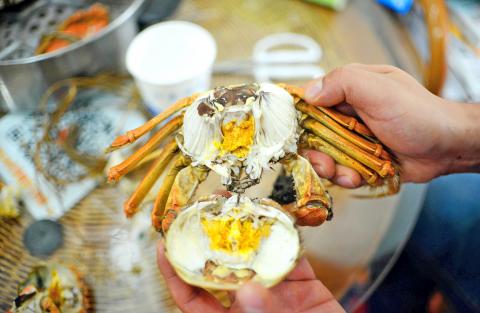China’s gourmet crab industry has followed high-end spirits and luxury cars to become the latest victim of communist authorities’ two-year-long crackdown on corruption, with government officials now shunning the pricey crustacean.
The arrival of freshwater “hairy crabs” — a delicacy so named for the bristles on its claws — on the market every autumn has long been eagerly awaited. However, the crab’s golden roe has lost some luster as the anti-graft and austerity campaigns launched by Chinese President Xi Jinping when he came to power in late 2012 show little sign of abating.
China is touted as the world’s largest luxury market, but its corruption hunt is having unintended consequences across multiple industries, slowing consumption.

Photo: AFP
Management consultancy Bain & Company on Tuesday predicted that luxury spending in China will shrink 2 percent this year due to “greater controls” and “changing consumption patterns.”
Banquet fare such as crabs and expensive liquor are off the menu, while the gifting of luxury goods — typically used for bribes or to launder money — has plunged.
“Consumption [of crabs] by government officials has dropped to almost zero,” said Yang Weilong (楊維龍), vice chairman of a China Fisheries Association branch.

Photo: AFP
In some parts of the country, hairy crab retail prices have plunged as much as 40 percent, Yang said, with average prices now about 120 yuan (US$20) for a 500g crustacean.
Demand from officials fueled a decade of price rises, but these days, sellers can only rely on private customers. The small green crabs are raised across eastern China, although purists say the best come from the murky waters of a shallow lake near Shanghai called Yangcheng.
“It is important for major crab sellers to adjust their prices to fit general consumers, otherwise they will suffer a great collapse just like the spirit maker Moutai,” Yang said, referring to Kweichow Moutai Co (貴州茅台酒), which dominates the top-end liquor market in China.
“Supply exceeds demand in the spirit sector. The whole industry continues to undergo a deep adjustment in a complex environment,” the company said in August.
The liquor giant’s first-half net profit fell slightly to 7.2 billion yuan this year, after posting growth of 13.74 percent for all of last year.
Luxury makers are trying to adapt to the changing conditions by targeting private-sector high-net worth individuals.
France’s Hermes International SA — known for its handbags and scarves — recently opened a flagship maison store in the Chinese commercial capital of Shanghai, only its fifth such establishment in the world.
The four-story shop offers a limited-edition crocodile handbag for US$80,000 and clerks hint that even the elusive Birkin bag might be available to VIP customers.
However, the French firm’s global watch sales fell 7 percent year-on-year in the first half, largely due to lower demand in China, its top timepiece market.
Despite the squeeze, it says other sectors are holding up:
“Maybe there is less gifting for others, but there are a lot of people buying for themselves,” Hermes chief executive Axel Dumas said.
Still, many executives say that a lack of clarity on when the corruption campaign will be reined in is casting uncertainty over the market.
Hundreds of officials have been snared in the anti-corruption drive, including high-level “tigers” such as former internal security chief Zhou Yongkang (周永康) and Liu Tienan (劉鐵男), once deputy director of the government’s top economic planning agency.
Many companies hope the fallout from the campaigns is only temporary, but in any case China is too big and important to ignore.
More than 114,000 official cars that were of higher specifications than regulations stipulate have been confiscated, Chinese Communist Party mouthpiece the People’s Daily reported last week.
The country is already the world’s largest auto market and its luxury car segment will overtake the US’ as the biggest as early as 2016, management consultancy McKinsey has forecast.
US auto giant General Motors is steadily adding models to its top-end Cadillac range and the company’s president for China Matthew Tsien (錢惠康) said: “We’re still quite optimistic with regard to overall growth in luxury.”
However, hundreds of crab breeders and traders are expecting losses for the season.
“Since Yangcheng Lake crab is mainly a gift, limits on publicly funded consumption are fatal to sales,” said Wang Zhiqiang, who runs a crab company.
“If the anti-corruption campaign continues, everyone will reduce production nonstop ... the industry will very quickly go into decline,” Wang said.

SEEKING CLARITY: Washington should not adopt measures that create uncertainties for ‘existing semiconductor investments,’ TSMC said referring to its US$165 billion in the US Taiwan Semiconductor Manufacturing Co (TSMC, 台積電) told the US that any future tariffs on Taiwanese semiconductors could reduce demand for chips and derail its pledge to increase its investment in Arizona. “New import restrictions could jeopardize current US leadership in the competitive technology industry and create uncertainties for many committed semiconductor capital projects in the US, including TSMC Arizona’s significant investment plan in Phoenix,” the chipmaker wrote in a letter to the US Department of Commerce. TSMC issued the warning in response to a solicitation for comments by the department on a possible tariff on semiconductor imports by US President Donald Trump’s

The government has launched a three-pronged strategy to attract local and international talent, aiming to position Taiwan as a new global hub following Nvidia Corp’s announcement that it has chosen Taipei as the site of its Taiwan headquarters. Nvidia cofounder and CEO Jensen Huang (黃仁勳) on Monday last week announced during his keynote speech at the Computex trade show in Taipei that the Nvidia Constellation, the company’s planned Taiwan headquarters, would be located in the Beitou-Shilin Technology Park (北投士林科技園區) in Taipei. Huang’s decision to establish a base in Taiwan is “primarily due to Taiwan’s talent pool and its strength in the semiconductor

An earnings report from semiconductor giant and artificial intelligence (AI) bellwether Nvidia Corp takes center stage for Wall Street this week, as stocks hit a speed bump of worries over US federal deficits driving up Treasury yields. US equities pulled back last week after a torrid rally, as investors turned their attention to tax and spending legislation poised to swell the US government’s US$36 trillion in debt. Long-dated US Treasury yields rose amid the fiscal worries, with the 30-year yield topping 5 percent and hitting its highest level since late 2023. Stocks were dealt another blow on Friday when US President Donald

UNCERTAINTY: Investors remain worried that trade negotiations with Washington could go poorly, given Trump’s inconsistency on tariffs in his second term, experts said The consumer confidence index this month fell for a ninth consecutive month to its lowest level in 13 months, as global trade uncertainties and tariff risks cloud Taiwan’s economic outlook, a survey released yesterday by National Central University found. The biggest decline came from the timing for stock investments, which plunged 11.82 points to 26.82, underscoring bleak investor confidence, it said. “Although the TAIEX reclaimed the 21,000-point mark after the US and China agreed to bury the hatchet for 90 days, investors remain worried that the situation would turn sour later,” said Dachrahn Wu (吳大任), director of the university’s Research Center for